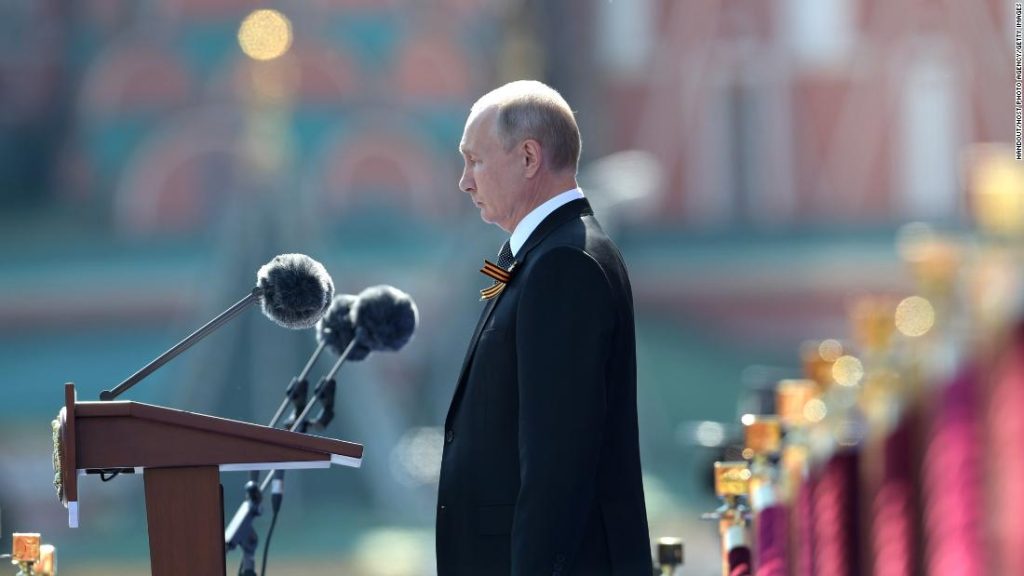“Blocking Russia’s access to the valuable professional services of the United States increases pressure on the Kremlin and cuts off its ability to evade sanctions imposed by the United States and our partners,” US Treasury Secretary Janet Yellen said in a statement. “We are also targeting Putin’s ability to generate revenues that enable him to engage in his aggression, as well as the entities and their leaders who support his destructive actions,” he added.
“This really is a failure for Putin, and we will continue to honor the brave fight of the Ukrainian people and listen to President Zelensky and recommit to continuing the path,” the senior administration official told reporters before meeting the president. Sunday meeting with the leaders of the Group of 7 and Zelensky.
The official added that the call would also highlight how Russian President Vladimir Putin was “disgraced” for the sacrifices made by Soviet Russian citizens, millions of whom gave their lives to defeat fascism during World War II.
“Putin is abusing those sacrifices by spreading his lies and misinformation about the barbarism he is committing in Ukraine… It’s really an opportunity to tell the truth and prove our continued unity,” the person in charge of the call said.
“Today’s combined actions are a continuation of the systematic and systematic removal of Russia from the global financial and economic system. The message is that there will be no safe haven for the Russian economy if Putin’s invasion continues,” the official told reporters.
The three television networks sanctioned by the United States are Russia’s Channel One, Russian TV-1 and NTV Broadcasting. Together, they earned more than $300 million in advertising revenue from Western countries just last year, according to the official.
“We will not work to help them spread the lies and deceit that you hear from Putin every day,” the official said.
The US State Department said in a statement that the new visa restrictions apply to “2596 members of the army of the Russian Federation and 13 Belarusian military officials”. The ministry said the individuals were targeted because they are “believed to be involved in human rights abuses, violations of international humanitarian law, or public corruption in Ukraine, including the so-called ‘Donetsk People’s Republic’ or ‘Luhansk People’s Republic’.”
Notably, US legal services were not included in Sunday’s ban. The US, according to the official, decided to continue allowing “due process” to be sought, but added that the government would continue to re-evaluate this “every day” and was waiting to see what happens after the initial ban on services. . The official noted that the United Kingdom had not imposed such a ban.
The official also took care to note that the sanctions against Gazprombank executives are only: actions against the leaders of the important financial institution and not a full penalty against the bank itself, which Europeans must deal with to continue buying Russian gas.
“This is not a complete block. We do not freeze the assets of Gazprombank or prohibit any transactions with Gazprombank. What we are pointing out is that Gazprombank is not a safe haven. And so we are sanctioning some of the top business executives who are the people sitting at the head of the organization to create a scary effect,” The official said.
The official said the decision to restrict exports of industrial products to Russia is aimed at hampering the Kremlin’s industrial capacity and ability to wage war, similar to the way Western restrictions on microchips limit Russia’s ability to make precision-guided missiles.
In addition to the export ban on Russian industrial services, the United States has also imposed sanctions on Promtekhnologiya LLC, which manufactures weapons, including rifles, used by Russian forces in Ukraine. The Nuclear Regulatory Commission will no longer allow the export of uranium, plutonium or other nuclear products.
G7 leaders said in a statement on Sunday that they pledged to “step up” short-term financial assistance to Ukraine in the coming weeks, as well as to continue developing options for the country’s long-term reconstruction.
“In the coming weeks, we will ramp up our collective short-term financial support to help Ukraine fill funding gaps and deliver essential services to its people, while developing options — working with Ukrainian authorities and international financial institutions — to support long-term recovery and reconstruction,” the statement said.
Meanwhile, Ukrainian Foreign Minister Dmytro Kuleba spoke with US Secretary of State Anthony Blinken on Sunday to discuss further sanctions on Russia and about the impact of the war in Ukraine on global food security.
This story has been updated with additional information.
Correction: An earlier version of this story miscalculated the amount of advertising revenue three Russian television networks received from Western countries last year, as cited by a senior Biden administration official. It was 300 million dollars.
CNN’s Devan Cole and Anastasia Graham Yule contributed to this report.

“Writer. Evil travel maven. Avid creator. Proud beer expert. Music lover. Explorer.”











More Stories
Jake Sullivan meets Yang Jiechi in Luxembourg, paving the way for a possible meeting between Biden and Xi
The CDC adds 3 places to its “high” risk list, including Mexico and the United Arab Emirates
Wordle 359 June 13 – Struggling with Wordle today? THREE CLUES TO HELP ANSWER | Games | entertainment